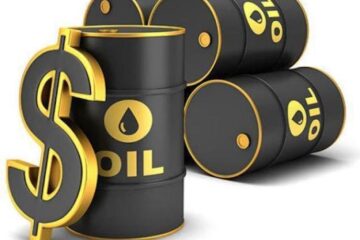Naira-for-crude: Dangote gets NNPCL’s first supply

Dangote refinery
The Dangote Petroleum Refinery has received four cargoes of crude oil from the Nigerian National Petroleum Company Limited under the naira-for-crude sale agreement, officials of the refinery and the Federal Government confirmed on Tuesday.
It was gathered that the four cargoes of crude were delivered to the refinery within the past three weeks when the government kick-started the sale of crude to local refineries in the local currency.
Informed sources about the local crude sale deal told our correspondent that the refinery was still waiting to receive more crude oil cargoes from NNPCL, the organisation managing the country’s hydrocarbon resources.
They also confirmed that the $20bn Lekki-based plant was now set to begin the direct sale of refined Premium Motor Spirit, popularly called petrol, to domestic dealers.
A source close to the Technical Subcommittee on Domestic Sale of Crude Oil in Local Currency, who did not want to be mentioned because he was not permitted to speak with the press, confirmed to The PUNCH that “more cargoes (of crude) would be delivered to the Dangote refinery in the coming weeks.”
The official disclosed that the programme started with the Dangote refinery as the only petrol-producing facility in Nigeria at the moment.
Speaking with our correspondent, a senior official of the refinery confirmed the development, saying the first phase of the naira-crude sale agreement would last for six months unless it is renewed by the Federal Government.
The official said she could not tell the cost of the crude oil per barrel.
“The naira-for-crude deal has started. The Dangote refinery has received four cargoes so far and we are still expecting more. The four cargoes have been delivered to the refinery within the past three weeks. We are still expecting more cargo in the coming week.
“Don’t forget that this first phase of the naira-crude sale is just for six months. The government may decide to renew it at the end of the first six months and they may decide not to. So, we don’t know what will happen yet after the first six months.”
Recall that the 650,000 barrels per day capacity refinery was greeted by crude challenges when it began operations some months ago.
The President of the Dangote Group, Alhaji Aliko Dangote, had cried out, saying some international oil companies were planning to sabotage the investment by refusing to supply crude.
The Dangote Group had alleged that the IOCs insisted on selling crude oil to its refinery through their foreign agents.
It said the local price of crude would continue to increase because the trading arms offered cargoes at $2 to $4 per barrel, above the official price.
The group also alleged that the foreign oil producers seem to be prioritising Asian countries in selling the crude they produce in Nigeria.
Despite the intervention of the Nigerian Upstream Petroleum Regulatory Commission in July, the group insisted that the IOCs were still frustrating the refinery.
The Vice President, Oil & Gas, Dangote Industries Limited, Mr Devakumar Edwin, said, “If the Domestic Crude Supply Obligation guidelines are diligently implemented, this will ensure that we deal directly with the companies producing the crude oil in Nigeria as stipulated by the Petroleum Industry Act.”
Edwin insisted that IOCs operating in Nigeria had consistently frustrated the company’s requests for locally-produced crude as feedstock for its refining process.
He highlighted that when cargoes were offered to the oil company by the trading arms, it was sometimes at a $2 to $4 (per barrel) premium above the official price set by the NUPRC.
“As an example, we paid $96.23 per barrel for a cargo of Bonga crude grade in April (excluding transport). The price consisted of a $90.15 dated Brent price plus $5.08 NNPC premium plus a $1 trader premium. In the same month, we were able to buy WTI at a dated Brent price of $90.15 + $0.93 trader premium including transport. When the Nigerian National Petroleum Company Limited subsequently lowered its premium based on market feedback that it was too high, some traders then started asking us for a premium of up to $4m over and above the NSP for a cargo of Bonny Light.
“Data on platforms like Platts and Argus shows that the price offered to us is way higher than the market prices tracked by these platforms. We recently had to escalate this to NUPRC,” Edwin said in July, urging the commission to take a second look at the issue of pricing.
Concerned by the controversies, President Bola Tinubu, during a Federal Executive Council meeting on July 29 proposed the sale of crude to local refineries in naira.
The Federal Executive Council adopted the proposal by Tinubu to sell crude to the Dangote refinery and other upcoming refineries in the local currency.
FEC approved that the 450,000 barrels meant for domestic consumption be offered in naira to Nigerian refineries, using the Dangote refinery as a pilot.
A media aide to the President, Bayo Onanuga, said in July that “the exchange rate will be fixed for the duration of this transaction.”
It could not be immediately confirmed whether or not the Federal Government had fixed the exchange rate in this current transaction with Dangote.
Operators have suggested that the current price of PMS would crash if the government sells crude to local refineries, pegging the exchange rate at N1,000 to a dollar instead of using N1,600.
Recall that the implementation committee headed by Edun said the sale of crude oil in naira commenced on October 1 as scheduled by the committee.
On September 13, 2024, the committee announced that the Federal Executive Council approved the sale of crude to local refineries in naira and the corresponding purchase of petroleum products in naira.
“From October 1, NNPC will commence the supply of about 385,000 barrels per day of crude oil to the Dangote refinery to be paid for in naira,” the committee had declared.
This implies that NNPC is to supply about 11.5 million barrels of crude oil to the Dangote refinery monthly, and based on the deal, the plant will release equivalent volumes of refined diesel and petrol to the domestic market also in naira.
The National Publicity Secretary of the Independent Petroleum Marketers Association of Nigeria, Chinedu Ukadike, said the supply of crude to Dangote refinery would address complaints of shortfall in PMS supply to the NNPC and other marketers.
”It is a very good gesture to allow Dangote to get enough crude to be able to refine petroleum products for us. I’m aware that the NNPC is complaining that Dangote is not producing enough. So, now that they have supplied up to four cargos to Dangote, it will reflect that PMS and other by-products of crude oil will be adequate. And we will no longer complain of a shortfall in supply; because a shortfall in supply of crude oil will lead to a shortfall in supply of refined products,” Ukadike remarked.
On pricing, he posited that demand and supply would determine the price of PMS as time goes by.
“Let us allow the factor of demand and supply to determine the price. I know there will be a time when these products will start descending instead of going up. I’m very sure,” the IPMAN spokesman submitted.
Petrol shipments to Nigeria dropped sharply in the first two weeks of October, S&P Global Commodity Insights ship-tracking data said, adding that the arrival of domestic supply from the Dangote refinery appeared to dim export appetite.
According to S&P Global Commodities at Sea data, just 280,400 barrels of gasoline and blendstock were dispatched to Nigeria in the first week of the month, ending October 6, down from a weekly average of 1.3 million barrels in August.
“In the week ending October 13, just one product tanker reported shipping gasoline to Nigeria, with just 290,567 barrels departing from Antwerp for delivery to Lagos. These two October cargoes fall significantly lower than the 12 dispatched in the first half of August and September respectively,” S&P Global said.
“The slump in export activity signals the first disruption to a previously well-established flow, mostly from Northwest Europe to West Africa, with the arrival of its own domestic refining capacity.
“Without its own domestic supply chains, Nigeria — Africa’s largest demand hub — has typically imported around 200,000-300,000 b/d of gasoline to service the bulk of its fuel supply, creating a dependency that Africa’s richest man, Aliko Dangote, sought to overhaul with the inauguration of his new refinery in January,” the report added.
Yet, with shipments to Lagos appearing to preemptively decline, traders were said to have flagged a potential shortfall in availability as domestic production remains insufficient to service consumption of over 300,000 b/d.
A document titled ‘Summary of Volume Loading’, said to have emanated from the state oil company has said the Dangote refinery was able to supply only 317 million litres out of the 1.065 billion litres it requested between September 15 and October 20.
However, another official said the refinery is ramping up production, saying it has about 245 million litres stored in its storage tanks, even as it targets 30 million litres of PMS daily.
“A faster-than-expected ramp up would accelerate pressure on global gasoline cracks in the Atlantic Basin to as early as first-quarter 2025, though as a very large single-train refinery, the plant remains exposed to outages and disruptions.
“Commodity Insights anticipates that the refinery will displace around 260,000 b/d of gasoline flows from Europe to West Africa by 2026, while sweet hydrocracking margins are seen as unlikely to recover substantially from an expected average of minus $1.50/b through Q4 2024 in Q1 2025,” S&P Global reports.
In the heat of the crude supply crisis, Oil producers, under the aegis of the Independent Petroleum Producers Group, also warned against being forced to sell crude oil to the Dangote Refinery and other local ones in Nigeria.
The IPPG also called on the NNPC to re-direct its allocated crude oil volumes to Dangote Refinery and other local refineries to mitigate the current crude supply shortage being experienced by the local refiners that is impacting local product availability in many parts of Nigeria.
The Chairman of IPPG, Abdulrazak Isa, in a letter dated August 16, 2024, and addressed to the Chief Executive of the NUPRC, Gbenga Komolafe, said the NNPC should utilise its allocated 445,000 barrels per day intervention crude oil volume to salvage the current situation as it did in many instances in the past.
Isa said some IPPG members already owned and or were supplying crude oil to local refineries but insisted that the NNPC was in a good position to mitigate the current crude supply shortfall faced by local refiners by leveraging its statutory crude allocation for meeting local domestic consumption.
“Historically, NNPC has always had an intervention crude oil volume (445kbopd) meant to satisfy the nation’s domestic consumption. This volume has always been used, under various swap mechanisms, to import refined products for domestic consumption.
“Since there is now domestic refining capacity to meet consumption, this dedicated volume should be reserved for all domestic refineries under a price hedge mechanism that can be provided by a suitable financial institution such as Afrexim Bank,’’ he stated.
Isa, however, maintained that, “Any national production above this allocated volume should be treated strictly as export volumes, adhering to the willing buyer, willing seller framework of the international market especially since the refiners will need to export excess products that surpass domestic demand thus boosting FX earnings.”
Specifically, IPPG said some of its members had received letters from the Dangote Refinery for crude supply nominations for October, and faulted the approach as bringing them under an obligation, saying it conflicted with the spirit of the willing-buyer, willing-seller framework prescribed by the Petroleum Industry Act 2021.
He asserted that the objective of enhancing the country’s petroleum value chain should be done within the confines of the law and existing obligations, expressing the confidence that an amicable solution could be reached by all stakeholders without jeopardising the existing commercial agreements, economic interests and business models of each segment of the oil and gas sector.
“While we fully support and commend the efforts of Nigerian entrepreneurs to enhance domestic refining capacity, it is important that no private sector business is unduly pressured into arrangements that may effectively subsidise another within the oil and gas value chain under any guise whatsoever.
“Under this willing-buyer, willing-seller framework, it is essential for refiners to negotiate and execute long-term crude oil Sales and Purchase Agreements with producers and their marketing agents. These agreements should follow industry best practices, with typical tenures ranging from one to five years,’’ the IPPG chairman said.
He added that some of them also received allocation letters from NUPRC for the supply of specific volumes of crude oil to the domestic market for the second half of 2024, expressing concerns about its potential implications for the economy, especially the foreign exchange earnings through royalties and taxes.
The group noted, “We understand that the current allocation methodology appears to be based on a matrix of production forecasts by producers, issued technical allowable rates as well as crude oil requirements of domestic refineries, rather than actual local consumption needs. This raises significant concerns as it suggests that allocations are being determined based on the demands of refiners, which may exceed what is needed for domestic consumption.
“Such an approach could lead to inefficiencies and unfairly disadvantage producers. Therefore, refineries with excess capacity beyond local consumption mustn’t exploit the Domestic Crude Oil Supply Obligations to the detriment of oil producers and other stakeholders, including the Government,’’ he said in August.











